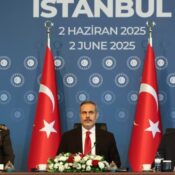
While ending the war games near Taiwan, China left the door open for more
The U.S. and Taiwanese governments condemned the day of war simulations that China’s military held on Monday, saying they were a warning against “separatist acts” and that they would take more measures against Taiwan if necessary.
Since President Lai Ching-te’s national day speech last week, democratically controlled Taiwan had been preparing for more war drills; nevertheless, some experts claimed Monday’s measures appeared to be timed to avoid escalating the U.S. presidential contest.
Beijing, which considers Taiwan to be its own territory, denounced Lai’s speech when he stated that China had no right to represent Taiwan while offering to work with Beijing. According to Lai and his administration, the future of Taiwan can only be determined by its citizens.
The “Joint Sword-2024B” exercises were conducted in the Taiwan Strait and regions to the north, south, and east of Taiwan, according to the Chinese military’s Eastern Theater Command.
However, China’s military ministry warned soon after they were finished that these exercises were not a rerun of the previous “Joint Sword-2024A” war games that were held in May, but rather a stepping up of pressure against Taiwan’s independence, and that more might come.
“The People’s Liberation Army’s actions will be pushed further with each ‘Taiwan independence’ provocation until the Taiwan issue is completely resolved,” the ministry stated in a statement.
The exercises served as a “stern warning” to Taiwan independence forces’ separatist actions, according to the theater leadership.
“It is a legitimate and necessary operation for safeguarding state sovereignty and national unity,” the statement read.
No dates for any additional large-scale drills were announced by the command.
It had previously released a map showing the nine locations where the drills were held: three on the west coast, one on the north coast, two on the east coast, and three surrounding Taiwan-controlled islands adjacent to the Chinese shore.
ASSAULT CORRIDORS IN AIR
According to the command, Chinese naval formations, destroyers, and planes were moving toward Taiwan in “close proximity from different directions,” concentrating on sea-air combat-readiness patrols, obstructing important ports and locations, and attacking targets on land and at sea.
The military said that China’s Liaoning aircraft carrier and its auxiliary vessels were also engaged east of Taiwan; Taiwan’s military was keeping an eye on the deployment.
It did not, however, declare any no-fly zones or live-fire drills, and according to a Taiwanese security source, there were no indications of a missile launch.
Chinese state media reported that while fighter fighters “opened up air assault corridors” and bombers conducted long-range operations, the rocket force conducted mock missile launches.
According to the Taiwanese Defense Ministry, the exercises included 125 Chinese military aircraft and 17 Chinese warships, the most it had ever seen flying over Taiwan in a single day.
However, Monday’s exercises seemed less dramatic than the 2022 incident in which China launched missiles over Taiwan just after then-U.S. House Speaker Nancy Pelosi was in the country.
Even though the larger drills were reportedly restricted to prevent unduly igniting the U.S. election campaign, Singapore-based security analyst Collin Koh said the extensive coastguard actions surrounding Taiwan seemed to be a new front in China’s ongoing “grey zone” operations against Taipei.
According to Koh of Singapore’s S. Rajaratnam School of International Studies, “aside from the election, I suspect the current economic situation doesn’t warrant a further aggravation that stems from heightened cross-strait uncertainty.”
Coastal Patrol Patrols
Shortly after Lai assumed office in May, China conducted two days of “Joint Sword-2024A” maneuvers outside Taiwan, claiming that they were “punishment” for separatist undertones in his inauguration address.
Given the delicate nature of the situation, a senior Taiwanese security official told Reuters, under condition of anonymity, that they thought China was blocking Taiwanese ports and international shipping routes in addition to preventing foreign forces from entering the country.
According to state broadcaster CCTV, China’s coast guard vessels made a major move on Monday by circling Taiwan and conducting patrols near the offshore islands of Matsu and Dongyin. They also entered the “restricted waters” of Matsu Island for the first time in an attempt to “tear up” boundaries established by Taiwan authorities.
Additionally, CCTV stated that China “may carry out regular law enforcement patrols around Matsu in future”
The exercises were denounced by President Lai, who said that they were “intended to undermine regional peace and stability and continue to coerce neighboring countries by force.” According to officials, the matter was discussed at a meeting of Lai’s National Security Council.
The Eastern Theatre Command included a cartoon caricature of Lai with devil-like pointed ears in a propaganda video, along with fighter jets and warships circling the island.
Given China’s larger missile capabilities and the US and its allies’ efforts to strengthen defenses against them, security analysts are keeping a careful eye on Chinese operations.
PROVOCATIONS OF BLATANTS
China policy-making in Taiwan China’s most recent war drills, according to the Mainland Affairs Council, were “blatant provocations” that gravely jeopardized regional peace and stability.
In a statement, Taiwan’s presidential office said that China should accept the Republic of China, which is Taiwan’s official name, and respect the people of Taiwan’s decision to live a free and democratic life.
Following Lai’s “routine” address, U.S. President Joe Biden administration officials in Washington stated they were keeping an eye on the drills and that there was no reason for them.
Using the initials for the People’s Republic of China, China’s official name, State Department spokesperson Matthew Miller stated, “We call on the PRC to act with restraint and to avoid any further actions that may undermine peace and stability across the Taiwan Strait and in the broader region.”
According to a second senior Taiwanese security source who spoke to Reuters, Beijing was engaging in “hybrid warfare” that encompassed economic pressure, propaganda campaigns, penalties on specific Taiwanese persons, and fake news operations, although the drills were not yet of a particularly concerning scope.
A well-known Taiwanese computer magnate named Robert Tsao and a politician were sanctioned by Beijing on Monday for their separatist actions.
With the benchmark index (.TWII) increasing 0.3% and no indication of public worry, Taiwan’s stock exchange mostly ignored the tensions.
All Categories
Recent Posts
Tags
+13162306000
zoneyetu@yahoo.com



